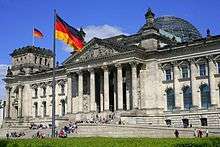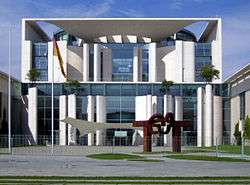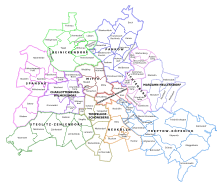Politics of Berlin

Berlin is a city-state and the capital of the Federal Republic of Germany. The President of Germany, whose functions are primarily ceremonial under the German constitution, has his official residence in Schloss Bellevue.[1] Berlin is the seat of the German executive, housed in the Chancellery (the Bundeskanzleramt). Facing the Chancellery is the Bundestag, the German Parliament, housed in the renovated Reichstag building since the government's move to Berlin in 1998. The Bundesrat ("federal council", functioning as an upper house) represents the Federal States (Bundesländer) of Germany and has its seat at the former Prussian House of Lords.
Capital city

Berlin is the capital of the Federal Republic of Germany. The President of Germany, whose functions are mainly ceremonial under the German constitution, has his official residence in Schloss Bellevue.[2] Berlin is the seat of the German executive, housed in the Chancellery, the Bundeskanzleramt.
Facing the Chancellery is the Bundestag, the German Parliament, housed in the renovated Reichstag building since the government moved back to Berlin in 1998. The Bundesrat ("federal council", performing the function of an upper house) is the representation of the Federal States (Bundesländer) of Germany and has its seat at the former Prussian House of Lords. Though most of the ministries are seated in Berlin, some of them, as well as some minor departments, are seated in Bonn, the former capital of West Germany. The Berlin-Bonn Act regulates the location of government branches in Bonn or Berlin.[3]
City-state
Since German reunification on 3 October 1990, Berlin has been one of three city-states (with Hamburg and Bremen) among Germany's 16 states. The city and state parliament is the House of Representatives, (Abgeordnetenhaus), with 141 seats. Berlin's executive body is the Senate of Berlin (Senat von Berlin). The Senate consists of the Governing Mayor (Regierender Bürgermeister) and up to eight senators with ministerial positions (one holding the official title "Mayor" (Bürgermeister) as deputy to the Governing Mayor). The Social Democratic Party (SPD) and The Left (Die Linke) took control of the city government after the 2001 state election, winning another term in the 2006 state election.[4] The 2011 state election produced a coalition of the Social Democratic Party and the Christian Democratic Union; for the first time, the Pirate Party won seats in a German state parliament.
The Governing Mayor is Lord Mayor of the city (Oberbürgermeister der Stadt) and Prime Minister of the federal state (Ministerpräsident des Bundeslandes). The office of Berlin's Governing Mayor is in the Rotes Rathaus (Red City Hall). From 2001 to 2014, this office was held by Klaus Wowereit of the SPD.[5] It is currently held by Michael Müller, also of the SPD.
The total annual state budget of Berlin in 2007 exceeded €20.5 ($28.7) billion, which included a budget surplus of €80 ($112) million (the first surplus in the city-state's history).[6] Due to increasing growth rates and tax revenues, the Senate of Berlin calculated an increasing budget surplus for 2008. The total budget was an estimated amount €5.5 ($7.7) billion, financed by the German government or the German Bundesländer.[7] Primarily due to reunification-related expenditures, Berlin as a German state accumulated more debt than any other city in Germany (an estimated €60 ($84) billion in December 2007).[8]
| Parties | Votes | % | +/- | Seats | +/- | |
|---|---|---|---|---|---|---|
| Social Democratic Party of Germany | 413,124 | 28.3% | −2.5% | 48 | −5 | |
| Christian Democratic Union | 340,992 | 23.4% | +2.1% | 39 | +2 | |
| Alliance '90/The Greens | 256,940 | 17.6% | +4.5% | 30 | +7 | |
| The Left | 170,829 | 11.6% | −4.6%[A] | 20 | −3 | |
| Pirate Party Germany | 129,795 | 8.9% | N/A | 15 | +15 | |
| National Democratic Party | 31,243 | 2.1% | −0.4% | 0 | ±0 | |
| Free Democratic Party | 26,916 | 1.8% | −5.8% | 0 | −13 | |
| Human Environment Animal Protection | 21,612 | 1.5% | +0.6% | 0 | ±0 | |
| Pro Germany Citizens' Movement | 17,829 | 1.2% | N/A | 0 | N/A | |
| Other parties | 50,732 | 3.5% | N/A | 0 | N/A | |
| Total | 100% | 152 | +3 | |||
| ^A Compared to the Party of Democratic Socialism and Labour and Social Justice – The Electoral Alternative combined. | ||||||
| Source | ||||||
Boroughs

Berlin is divided into twelve boroughs (Bezirke), reduced from 23 boroughs before Berlin's 2001 administrative reform. Each borough has a number of localities (Ortsteile), which often have historic roots in older municipalities predating the formation of Greater Berlin on 1 October 1920 and were urbanised and incorporated into the city. Many residents strongly identify with their localities (or boroughs). Berlin has 96 localities, commonly made up of several city neighbourhoods (known as Kiez in the Berlin dialect).
Each borough is governed by a council (Bezirksamt) with five councillors (Bezirksstadträte) and a borough mayor (Bezirksbürgermeister). The borough council is elected by the borough assembly (Bezirksverordnetenversammlung). The boroughs of Berlin are not independent municipalities; the borough governments' power is limited, and subordinate to the Berlin Senate. The borough mayors form a council of mayors (Rat der Bürgermeister, led by the city's governing mayor), which advises the Senate. The localities have no local government bodies, and the administrative duties of the former locality representative (the Ortsvorsteher) were assumed by the borough mayors.
Sister cities
Berlin maintains official partnerships with 17 cities.[9] Town twinning between Berlin and other cities began with Los Angeles in 1967. East Berlin's partnerships were cancelled at German reunification, but later partially reestablished. West Berlin's partnerships were limited to the borough level. During the Cold War the partnerships reflected spheres of influence, with West Berlin partnering with Western capitals and East Berlin partnering primarily with cities of the Warsaw Pact and its allies.
There are joint projects with a number of other cities, such as Belgrade, Copenhagen, Helsinki, Johannesburg, Shanghai, Seoul, Sofia, Sydney and Vienna. Berlin participates in international city associations such as the Union of the Capitals of the European Union, Eurocities, Network of European Cities of Culture, Metropolis, Summit Conference of the World's Major Cities, Conference of the World's Capital Cities. Its sister cities are:[9]
- 1967 Los Angeles, United States
- 1987 Paris, France
- 1988 Madrid, Spain
- 1989 Vienna, Austria
- 1989 Istanbul, Turkey
- 1991 Warsaw, Poland[10]
- 1991 Moscow, Russia
- 1991 Budapest, Hungary
- 1992 Brussels, Belgium
- 1993 Jakarta, Indonesia
- 1993 Tashkent, Uzbekistan
- 1993 Mexico City, Mexico
- 1993 Bern, Switzerland
- 1994 Beijing, China
- 1994 Tokyo, Japan
- 1994 Buenos Aires, Argentina
- 1995 Prague, Czech Republic
- 2000 Vaduz, Liechtenstein
- 2000 Windhoek, Namibia
- 2000 London, United Kingdom
References
- ↑ "Bundespräsident Horst Köhler" (in German). Bundespraesident.de. Retrieved 7 April 2012.
- ↑ "Bundespräsident Horst Köhler" (in German). Bundespraesident.de. Retrieved 7 April 2012.
- ↑ "Der Regierungsumzug ist überfällig". Berliner Zeitung (in German). 26 October 2010. Retrieved 7 April 2012.
- ↑ "Berlin state election, 2006" (PDF). Der Landeswahlleiter für Berlin (in German). Retrieved 17 August 2008.
- ↑ "The Glamor Guy". Time Europe. 8 May 2005. Retrieved 17 August 2008. See also: Landler, Mark (23 September 2006). "Berlin Mayor, Symbol of Openness, Has National Appeal". The New York Times. Retrieved 17 August 2008.
- ↑ "Berlin schafft erstes Etatplus seit dem Krieg". Spiegel.de. Retrieved 7 April 2012.
- ↑ Fahrun, Joachim (10 June 2008). "Sarrazin: Keine neuen Schulden mehr ab 2008". Berliner Morgenpost. Retrieved 17 August 2008.
- ↑ "Debt-Laden Berlin Goes to Court For Federal Aid". Deutsche Welle. 29 April 2006. Retrieved 20 October 2006.
- 1 2 "Berlin's international city relations". Berlin Mayor's Office. Retrieved 22 August 2010.
- ↑ "Miasta partnerskie Warszawy". um.warszawa.pl. Biuro Promocji Miasta. 4 May 2005. Retrieved 29 August 2008.